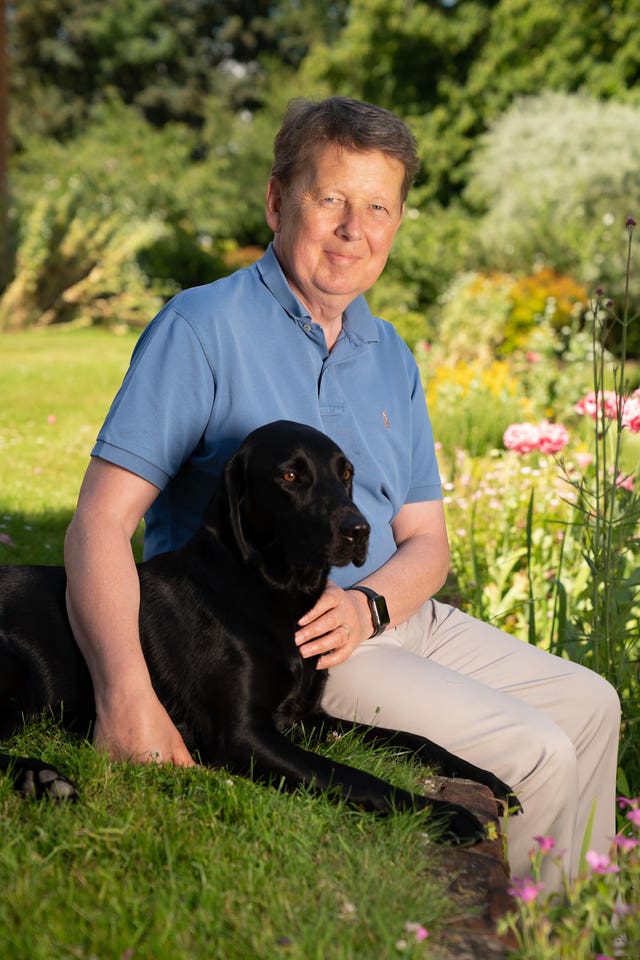
TV presenter and journalist Bill Turnbull has died at the age of 66, his family has said.
They said the BBC Breakfast presenter died “peacefully” at home in Suffolk on Wednesday after a “challenging and committed fight against prostate cancer” which had been diagnosed in November 2017.
His Breakfast co-presenter Susanna Reid wrote on Twitter: “Bill was the kindest, funniest, most generous man in the business. I feel lucky to have worked with him and he taught me everything. But above all, he was devoted to his family and I am heartbroken for them. RIP Bill. We will miss you so much.”
Turnbull, who appeared on the BBC1 show from 2001 until 2016, revealed the diagnosis in March 2018 and detailed his treatment in a Channel 4 documentary called Staying Alive.
 Bill Turnbull (Pete Dadds/Channel 4)
Bill Turnbull (Pete Dadds/Channel 4)
In October last year he announced he was taking a leave of absence from his show on Classic FM for health reasons.
His family praised the treatment he had received at the Royal Marsden and Ipswich hospitals, St Elizabeth Hospice and his GP.
They added: “He was resolutely positive and was hugely buoyed by the support he received from friends, colleagues, and messages from people wishing him luck. It was a great comfort to Bill that so many more men are now testing earlier for this disease.
“Bill will be remembered by many as a remarkable broadcaster who brought warmth and humour into people’s homes on BBC Breakfast and Classic FM.
“He was also a devoted Wycombe Wanderers fan and an ever-aspiring beekeeper.
“Bill was a wonderful husband and father to his three children; his family and friends will miss how he always made them laugh, and the generosity and love he shared with those around him.”
He started his broadcast career at Scotland’s Radio Clyde in 1978, joining the BBC as a reporter for the Today programme in 1986 before becoming a reporter for BBC’s Breakfast Time two years later.
In 1990, Turnbull became a correspondent for BBC News and reported from more than 30 countries, with notable stories he covered including the Monica Lewinsky scandal and the OJ Simpson trial.
After moving back to the UK, he became one of the main presenters on BBC News 24, as it was called back then.
Turnbull also worked for BBC Radio 5 Live, including presenting Weekend Breakfast.
He joined BBC Breakfast in 2001 as a presenter alongside Sian Williams and they worked together until 2012 when she departed after the programme moved from London to Salford.
The presenter co-anchored alongside Susanna Reid, with the pair presenting together until 2014, when Reid left the show to join ITV, and Turnbull’s other co-hosts included Louise Minchin and more.
Recalling his most memorable moments from his breakfast career as he signed off from the red sofa in February 2016, he recalled “nearly getting into a fight with a ventriloquist’s dummy called Bob” and wearing a jumper made of dog hair.
“It was all right, it was just very warm and I couldn’t get the stuff off me for weeks,” he said.
He made numerous television appearances outside of BBC Breakfast, including as the presenter on BBC One’s Songs Of Praise.
In 2005, he competed as a contestant on Strictly Come Dancing partnered with Karen Hardy, and was the seventh celebrity voted off the show.
Other TV appearances include ITV’s Who Wants To Be A Millionaire? and Through The Keyhole; the BBC’s Celebrity Mastermind, Would I Lie To You?, Pointless Celebrities and Room 101, and he appeared in the dictionary corner for Channel 4′s Countdown.
In 2011 he appeared in the Doctor Who episode The Wedding Of River Song in which he played himself.
His passion for beekeeping led to the 2011 publication of his book The Bad Beekeepers Club, a humorous account of the ups and downs of an apiarist.



Why are you making commenting on The Herald only available to subscribers?
It should have been a safe space for informed debate, somewhere for readers to discuss issues around the biggest stories of the day, but all too often the below the line comments on most websites have become bogged down by off-topic discussions and abuse.
heraldscotland.com is tackling this problem by allowing only subscribers to comment.
We are doing this to improve the experience for our loyal readers and we believe it will reduce the ability of trolls and troublemakers, who occasionally find their way onto our site, to abuse our journalists and readers. We also hope it will help the comments section fulfil its promise as a part of Scotland's conversation with itself.
We are lucky at The Herald. We are read by an informed, educated readership who can add their knowledge and insights to our stories.
That is invaluable.
We are making the subscriber-only change to support our valued readers, who tell us they don't want the site cluttered up with irrelevant comments, untruths and abuse.
In the past, the journalist’s job was to collect and distribute information to the audience. Technology means that readers can shape a discussion. We look forward to hearing from you on heraldscotland.com
Comments & Moderation
Readers’ comments: You are personally liable for the content of any comments you upload to this website, so please act responsibly. We do not pre-moderate or monitor readers’ comments appearing on our websites, but we do post-moderate in response to complaints we receive or otherwise when a potential problem comes to our attention. You can make a complaint by using the ‘report this post’ link . We may then apply our discretion under the user terms to amend or delete comments.
Post moderation is undertaken full-time 9am-6pm on weekdays, and on a part-time basis outwith those hours.
Read the rules hereLast Updated:
Report this comment Cancel